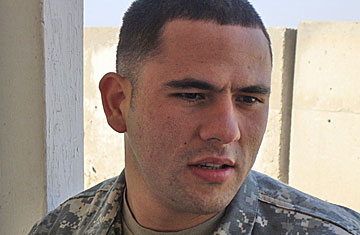
U.S. Army Sgt. Evan Vela outside the courthouse in Camp Liberty in Baghdad, Iraq
After a two-day trial, a U.S. Army court-martial jury of three officers and five enlisted soldiers found Sgt. Evan Vela guilty of murdering an unarmed Iraqi man and guilty of helping to plant an AK-47 on him to make the killing look justified. It is a sentence that demonstrates the Army's willingness to hand down serious punishment to soldiers who kill noncombatant civilians. The jury ordered Vela to 10 years in prison, a reduction to the rank private, forfeiture of all pay and benefits and a dishonorable discharge. But the penalty was also seen as a concession to the extraordinary pressures under which soldiers decide whether to take or preserve life. The maximum possible sentence was life without parole; the prosecution had recommended a minimum sentence of 15 years.
This trial was the third to come out of the May 11, 2007, shooting death of Genei Nesir Khudair Al-Janabil. The incident took place when an elite sniper-scout squad's mission went wrong near the city of Iskandariyah, which is 30 miles south of Baghdad. In separate courts-martial late last year, Sgt. Michael Hensley (who was the squad's leader) and another soldier, Pvt. Jorge Sandoval, were acquitted of murder charges. They were convicted of planting evidence.
During this trial, civilian defense attorney James Culp argued that Vela, who fired the single 9 mm pistol round to the head that killed Al-Janabi, was not guilty of murder because he was suffering from severe sleep deprivation, dehydration and exhaustion. Culp argued that Vela was not in control of, or even fully aware of, his actions. "You will not find a killing in this country more saturated with mitigating and extenuating circumstances than this one," he told the court today.
The shooting happened as Vela's unit was struggling to complete a particularly grueling pair of back-to-back two-day missions in one of the country's most dangerous regions. The men would hike at night with 150-lb. rucksacks, crossing several marshy canals with chest-high water to reach their destination by dawn. They would then break into two- or three-man teams to conduct surveillance all day under the 120-degree sun with only three or four liters of water per person. Throughout, the soldiers often slept no more than 15 minutes at a time. By the fourth day, still deep in hostile territory, the ailing five-man squad consolidated and holed up in a hideout to try to get a few hours of uninterrupted rest.
Despite his best efforts to remain vigilant, Vela fell asleep during his one-hour turn guarding the others. He was awakened by Al-Janabi, who had somehow gotten into their hideout and was standing just a few feet from him. Some of the men were so exhausted that they were difficult to rouse, even when told their position had been compromised. Once Hensley awoke and processed the seriousness of the situation, he took charge, pinning the man to the ground and searching him. The men spotted Al-Janabi's 15-year-old son nearby and gestured him into the hideout. Soon after, however, Hensley ordered everyone but Vela out of the hideout and released the boy. "I just sat there, in a kind of daze, with my pistol propped on my knee," Vela told the court. Then, Vela testified, Henlsey moved out of the way and said shoot. Vela did. But, said Vela, his response was a reflex and not a conscious decision. "I don't remember pulling the trigger," he said. "It took me a while to figure out that the shot had come from the pistol in my hand."
During closing arguments, Culp recapped several issues introduced during the trial that he said called the murder charge into doubt. He emphasized a medical expert's testimony about just how dangerous extended sleeplessness can be. In one study he cited, test subjects whose blood alcohol level was .05 performed better at a driving simulator than those who had been kept awake for 24 hours. And cognitive function and memory retention declines exponentially as one day without sleep stretches into two and then three. "This is the elephant in the room," Culp said. "How completely, utterly, totally sleep deprived these men were. This killing was not murder, but a horrible accident committed by a severely impaired soldier."
Lead prosecutor Maj. Charles Kuhfahl, however, maintained that the case was, in fact, elementary. "This is a simple case," he said. "But the defense presented a kaleidoscope of defense arguments in the hope of confusing you." The fundamental issue, he said, was this: "U.S. Army soldiers do not kill unarmned, detained individuals." The jury returned its guilty verdict after three hours of deliberation.
During the sentencing proceedings immediately following the verdict, Al-Janabi's son Mustafa said to the jury, "I know this criminal has a wife and family and they will miss him when you put him in jail, but we also miss our father. I hope you will consider that. Please don't forget about us." Speaking to the jury himself, Vela asked for leniency. "I am sorry that all I can say is that I am sorry and ask for your mercy. I failed your standards and I failed my own."
